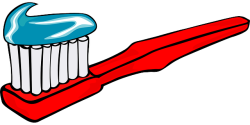By Dr. Paul Massari
 Dental hygiene is something we’re taught about as a child, but we often neglect as we grow older. With people going from one task to another, we often do not brush accordingly. This causes cavities, plaque buildup and a plethora of dental hygiene problems that we must take very seriously. Utilizing a manual or electric toothbrush will ensure that a person is able to clean all of their four quadrants effectively – but which one is better?
Dental hygiene is something we’re taught about as a child, but we often neglect as we grow older. With people going from one task to another, we often do not brush accordingly. This causes cavities, plaque buildup and a plethora of dental hygiene problems that we must take very seriously. Utilizing a manual or electric toothbrush will ensure that a person is able to clean all of their four quadrants effectively – but which one is better?
Manual Toothbrushes – Effective and Affordable
Manual toothbrushes are simple, yet effective. These brushes are more affordable than their counterparts, but they also lack in some of the functionality that can make an electric toothbrush much more effective. Manual brushes have the following traits:
Pros
• Manual toothbrushes are very inexpensive and can be purchased at virtually any food or health store. There is no need to change out expensive brush heads or spend extra electricity on charging a battery.
• When used correctly and for the appropriate amount of time, a manual toothbrush will be able to rid the mouth of plaque.
• Those with sensitive teeth will have full control over the speed and pressure during their brushing session.
Cons
• Manual toothbrushes are dated. They do not have a way to track time or even tell a user when it is time to replace the brush in most cases.
• Manual brushes are less effective than their counterparts and remove less plaque.
• Manual brushes do not come with changeable heads that allow them to be more versatile when used.
The trick to making a manual toothbrush effective is brushing for the dentist-recommended times. This means that a person should brush 2 – 3 times a day for a minimum of 2 minutes each time. This has been studied and shown to be the ideal time needed for adequate hygiene.
 Electric Toothbrushes – Effective and Feature-filled
Electric Toothbrushes – Effective and Feature-filled
Electric toothbrushes are not as widely used as their counterparts, but they are still highly effective when it comes to cleaning teeth. In fact, studies have shown that when used as directed, electric toothbrushes can remove up to two times the plaque than that of a manual toothbrush.
Pros
• Most electric toothbrushes come with a timer to ensure a person always brushes for 2 minutes.
• Changeable brush heads and modes allow a person to not only clean their teeth, but whiten them or do a deep cleaning.
• Through the immense power of these brushes, double the plaque is removed within the same timeframe.
Cons
• Electric toothbrushes are more costly than that of a manual toothbrush.
• Replacement brush heads are often expensive.
• Replacement parts need to be purchased from the company or another retail outlet and may not be available in regular retail outlets.
• Battery charging can become a tedious task and may leave a person defaulting to a manual toothbrush when their electric counterparts are charging.
While manual toothbrushes have been a staple in homes, they are being challenged by the electric toothbrush. The latter simply provides supreme cleaning power and many of the functions that users want, such as a timer and cleaning modes. When used correctly, both will be able to rid a person’s mouth of plaque and ensure that their teeth are always cleaned to the highest of standards.
– Dr. Paul Massari is an Italian dentist living in Milan, Italy. He is currently running a website about electric toothbrushes at electrictoothbrushking.com and contributing to other online projects, while helping dentists promote their activity online.
